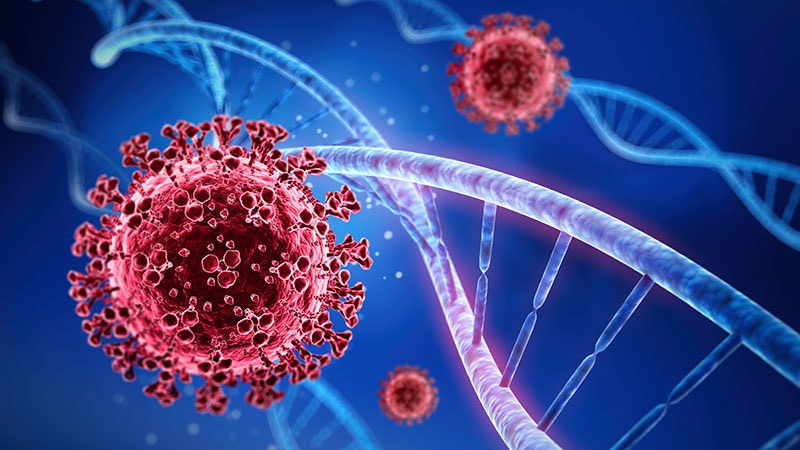A large-scale global study has identified genetic variants that are risk factors for long COVID, a discovery that helps researchers better understand the biological systems involving the disease and one small, early step toward the elusive goal of developing a long COVID diagnostic test.
International researchers with the Long COVID Host Genetics Initiative used data from 33 independent studies and 19 countries across North America, Europe, the Middle East, and Asia to analyze the genomes of nearly 16,000 patients with long COVID, representing populations from six genetic ancestries. Nearly 1.9 million controls were included in the genome-wide association study, a research method that scans complete sets of DNA to identify genetic variations associated with a specific trait or disease.
Genetic variants found in the FOXP4 gene had a statistically significant risk linked to long COVID, the study, published in Nature Genetics, found. The FOXP4 gene is known to impact lung function, and its expression levels were higher in those with long COVID than in controls. In addition, the risk variants had a consistent effect across different ancestries.
The researchers also found a causal relationship between a SARS-CoV-2 infection and long COVID and an additional causal risk between infections severe enough to require hospitalization and long COVID. Researchers also analyzed possible connections between variants associated with long COVID and those linked to other diseases and conditions.
Scientists said the overall findings provided evidence that was consistent with long COVID research that suggests both individual genetic variants and environmental risk factors contribute to disease risk. The findings also provide genetic proof linking abnormal lung physiology and the development of long COVID, the authors concluded; however, they noted that long COVID symptoms are not only limited to lung function and may include fatigue and cognitive dysfunction as well.
The study’s co-author, Hanna Ollila, PhD, with the Institute for Molecular Medicine Finland, University of Helsinki, Helsinki, Finland, underscored that the newly discovered genetic variants were not predictive for clinical tests or personal disease risk.
“The findings from our study, and from genome-wide association studies in general, tell about biological mechanisms behind a disease. This can then help to understand the disease better. For example, is it a disease neuronal, immune, metabolic, and so on?” said Ollila, who is also a researcher with the Department of Anesthesia and Center for Genomic Medicine at Massachusetts General Hospital, Boston. There are still many steps between these types of discoveries and the development of a diagnostic test, she explained, since these types of genetic variants do not function like high-impact variants such as the BRCA mutations in breast cancer.
“In other words, they do not strongly predict whether someone will develop long COVID at the individual level,” Ollila said. “Instead, they highlight the biological systems involved in the disease. In this case, our findings point to immune pathways related to lung function.”
Ollila explained that genetics can guide diagnostic development by pointing to underlying mechanisms, which may then help identify biomarkers in blood or other tissues. These biomarkers could eventually contribute to diagnostic tools, but it is a process that takes time and collaboration and often depends on progress across several fields of research including imaging and clinical phenotyping.
Researchers hope that when larger sample sizes become available for bigger studies, the analyses and understanding of the correlations will become more precise, bringing more understanding and clarity on genetic risk factors, biological mechanisms, and biomarkers that could someday help with disease diagnosis.
“We are likely still several years away, and possibly even a decade or more, from having a clinically useful diagnostic test based on genetic or biological markers for long COVID,” said Ollila. “That said, progress is accelerating thanks to the growing number of well-characterized cohorts and international collaborations. While these genetic findings are not yet ready for clinical application, they are an important step toward understanding long COVID, its relationship with other diseases, and the disease mechanisms that modulate risk for long COVID.”
